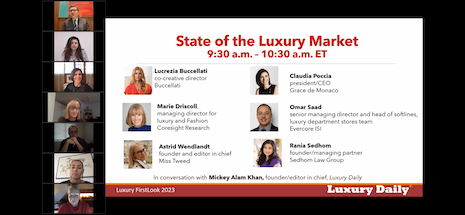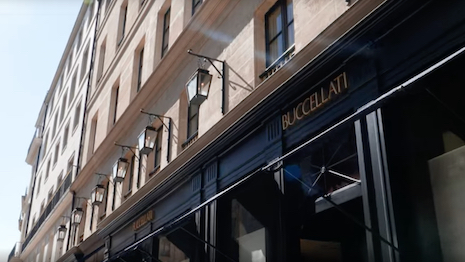While the bulk of luxury’s consumer base are generally resilient in the face of tech layoffs, inflation and other current economic challenges, the cohort is subject to something stronger.
As discussed during last week’s Luxury FirstLook 2023 webinar, changes in attitudes and behaviors, ones caused by news and “noise,” could ultimately end up impacting these individuals’ spending, instating hesitation in the face of fear. During the hourlong “State of the Market” session, experts argued that it is more crucial than ever before to connect with a wide breadth of clients — those that overlook the task at hand could risk loss of market share.
“I have a bullish bias toward luxury,” said Omar Saad, senior managing director and head of softlines, luxury, department stores team at Evercore ISI, New York.
"In the markets, we’re always looking for businesses that have moats, they are indefensible,” Mr. Saad said. “Well this business has the best moat of all — it’s called time.”
“There are no new entrants because to be a luxury brand, you have to be really old, and there’s no investor… that wants to start a new brand with a 100-year investment horizon – you have a fixed amount of competition and ongoing global demand growth over time.”
The Jan. 26 digital event was moderated by Mickey Alam Khan, editor-in-chief of Luxury Daily, New York.
Revenge spending still stands
Second up of last Wednesday’s planned programming, Luxury Daily's hourlong “State of the Market” session included six total speakers from around the world.
Representatives of Buccellati, Grace de Monaco, Coresight Research, Evercore ISI, Miss Tweed and Sedhom Law Group — in order of digital appearance — each offered salient comments on the state of the luxury market from the perspective of their own respective sectors.
Continuing on during his segment, Mr. Saad also points to a common misperception about the pandemic and sector growth, stating that though the industry did well, it did not “boom,” as many suggest.
 Luxury Daily's hourlong “State of the Market” session included six total speakers from around the world. Image credit: Luxury Daily
Luxury Daily's hourlong “State of the Market” session included six total speakers from around the world. Image credit: Luxury Daily
The expert also points to a widespread underestimate of the potential of Chinese performance in terms of spending on travel and experiences.
“Now the good news for luxury is, it's one of the sectors that really benefits from travel,” Mr. Saad said.
“Obviously there is a tremendous amount of spending on luxury goods when consumers travel.”
In the U.S., Mr. Saad argues that pandemic limits sparked a mindset shift among baby boomers, who now wonder what the purpose of stockpiling so much cash is at the hands of unpredictable global circumstances.
Thus, the group is beginning to spend with unprecedented levels of haste. Similarly, as Gen Z buyers enter the market, luxury brands are meeting the moment with inclusive, versus exclusive, efforts.
“They have flipped the entire model on its head in the last five to 10 years, truly opening the aperture of the audience to almost anyone,” Mr. Saad said.
Quality digs
In an interesting method of combating inflation, the senior managing director points to the rising popularity of “trading up,” or making more expensive purchases upfront to avoid having to replace items of lesser quality later down the line. The practice advantages luxury goods sales.
One expert in particular agreed with Mr. Saad, expanding on the premise during the digital event.
“Once you’ve tasted luxury you don’t want to go back,” said Marie Driscoll, managing director of luxury and retail at Coresight Research, New York.
Luxury captured a lot of new audiences [from] 2020 to 2022,” she said. “Some of those people are going to say, ‘I’d rather not buy, I’d rather buy less and I’d rather buy quality.’
“‘I’d rather buy a Louis Vuitton handbag, than trade down,’ and so I think there is a stickiness to luxury.”
 Marie Driscoll, managing director of luxury and retail at Coresight Research, New York, and Omar Saad, senior managing director and head of softlines at Evercore ISI, New York. Images courtesy of Marie Driscoll/Evercore
Marie Driscoll, managing director of luxury and retail at Coresight Research, New York, and Omar Saad, senior managing director and head of softlines at Evercore ISI, New York. Images courtesy of Marie Driscoll/Evercore
Ms. Driscoll goes on to deliver a rough timeline for these events as well. During her segment, the analyst mentioned that widespread sticker shock is still no match for pent-up demand, as consumers continue to eat out, fly and seek live entertainment, despite inflated prices, in alignment with the previous speakers' accounts.
“People were buying things and cleaning out luxury inventory in 2020 and 2021,” Ms. Driscoll said.
“When you think about luxury and beauty, in an environment where there were no experiences, buying luxury was the best experience you could have,” Ms. Driscoll said. “All of a sudden you are part of a new world.
“People that I knew were calling me up saying, ‘I never really was going to buy the Celine handbag, but I’m buying it now, I have nothing else to do, I deserve this.”
Overall, the analyst spoke to market evolution, and the mindset that underlined shifts.
“After a few years of double-digit growth in luxury, you have now the situation where we are experiencing inflation, we have daily headlines of tech layoffs of the tens of thousands, and …the wealth effect that really helps the higher-end earner spend [is impacted by noise],” Ms. Driscoll said.
“In 2022, the inventory started to right, [but] we had new forces, inflation hit, and the stock market got bumpy,” she said. “This year, we sit at a different point.”
{"ct":"VndU8AfaZdq0WD9h0OhwiBb7\/TFfhi\/iPjfCdxGLvHwL0NgqUNW6gxhHT0DJcmIg8nbwz4Seu8PA2Uq47utCYKmV6PDg7hqAMMjPasYVHsJSqNlGTrLOOEPlxPpo3xdDYe5mWNEX3zUM42R29TvXYLcRjvYvfr+qrrGZzJY9HUhTWvbNWvQ7sygW4xC3eT\/jrMjHebr0GPcGRedT3P2XnajyYVc2IXRH75gXdiU62aBuICbid38cdoE5vpOO0LF+PiebjJCy+uPc7sFAhevbKYZrCy5AKsYBcWkQ\/N0fJWgB\/rlgAXX9CVUhDVUtXuVnVvGIxja+CaJgIjGsNoTIk3sfnYuxiz0mYMXT+S974AVjTE7HFofA1rJd7JO+UN1ypRoZBNtRV\/7WPX9FuZZ4gCUwESiqxLGtk+4vQuecPwzJXccE5dFv7hufPIa3m+GZGrr5pdS1WH8aiUVzU9C9NSNy5BmWDDcDRF126q5Thyij4TKbgjVL27wr3d7qkaURrvQtAg01AOjzjkuRY8CeYDcqvLWHVjFoAzpbaG3296Vp3juhPskAt9drKws833d\/gpsDEjTXTyNl3JLaQyjNAwxkJCuBa0w1JSIBFifn5vkpaKuQqFvKJZ3+23NVHX+JyeUnp3hmKvqga6m9ojVNxcx2aJhfOKTHNkUAarXrjIGPo5TIVIYbp0LMBH1ax5TrCG9lpjfPPmD\/vs8uv59peEXb2Lt15JFtusEhOQUL41FKVaG3j5rbuk8Wx62ecKfd\/qE2qSRxRYW6jm0IfjeBhGlVZX0F3Kbfaem0O\/wFzMw\/QvoI\/yQRYtib9dNqFBsTGVebg6EGeTXHUrnMgsBmfuiCdsaZ+3l0ls0z56xX48IVVksn8Z5bZr\/vnLyAbveFaLannDSjBhKB6z850pXopaHR8ifLsIF11rqZGfORDhWTWSeYMGHt7SW0cJp78oWJ+AqdyhApAOImU+HPDySZNFXanvsnFrh8skDVDoGbFHdFJS6nCIHYbgGM95VtF+nsHZ3NdTQ4VBqnOY1OheAfGRJnswZjnGZ\/JOlSHP8qKObWRSNEIjuy1J9zoze9DwD1xXRUbVeIk7y2gYSsBqUhn0gTKINDco5tHX6\/o9CFit3pnMiBLRMiLZxEDaKo5afBJig2NyHbJbfnypscDFNiqOqn4n8PDljWhT6PESch58gSl0\/jS0Lp7YnorlnLj6hy2SENpdBzv5kbEB7g9fG31TyJoD773iQZGO2tjW8TPncvrk2PwPPyc3xOUxmC3KrvdpSCmq+zS4Fma4aa3uwQ90sfBxmE4dpW3jgC1GaS25Z8gFCJG6ISxQFSTUiyJ+nrh41xk3sWKPO5H4Yzxok1YBzY3vMpFzftQvX5yhGI1VfIVoJd0AnDVtiUWlBtNCLbYOesIKVZkyAXhzHiWVJ1xFapaolSaPyO+JYAmZJl5VvtNSoggXSKrNCosdZ3LD+VD2BSwY5prWClCOQ272oSQ9MePz5Ejg4L2n4o37qDKs\/sJnrTdtgc8wdjFs\/iTKLMqAY6iHE6xZ49PrrGkLukO9n4\/adiqFLHWHe0W2kpGfZxw8GPCdQSDSxYF5ZSk6d3FqIz1TJzVTTXhgQdFlF3UAuMZyhzzxT3FLWIz14LsAU4XoP4206KBhvGLvus5ZWLacCdfiC6LT3HkKpcpZIi0kCLnRZLLK78R3S3k5brGrhEImOP684xLx39ui+jNgar1nRpZTTXMtoGh9zOq2yFMWGP5rXfxIVHUnNwlU5b2QyM6EKdNwMofI1CVtnKZL50pgNZeULoG94TF1SQrExbwWcims\/zuI0Uee9oN05HIthFjLUDm3hIyiArpe0fkDowYimeHZ2hm\/9u5G\/uUbJBgWT2\/xpHt3w8xAyjdZs546JcDWjX+ufEHXGeGD9Fo5tVtKT7GsbQgNM6BjB5gl2j7+u7l\/c327ANUBJxZKwTiwYeugx9d0u5TGFZz67m+wZE+NYeEhGGxvNWqzTPL5YRJhJb2BAe3hfi08r5\/eupKgjojuJd3v0KyXoXaOhqzO\/NPwEQsiQBeCYG0tWFt\/FttrHCXMdF9+hJstfYp+UBawclzI4CCvYmiTE5cEzuJtv2v4c0HDyHbu+k1KotgkkqhmoSDz+sPcNbpvCPz7DaNCkFIAuyElf3+AeHoqAMs380QoJmj044Vntuohlznp2yKB543zTJH6xWAuWZr7UumcXJKzUonM1LLxpxbdzHDWDubI\/7B6e9Qi1ZiP6rYF8KvHhfz74HJoymkRkEs11ZO4fCTwBHbaB3AKy\/9y\/e7Bkux21HglmVcuRcZ1\/6birRrfhpCke0jNBju+JAGx10HEwpz2diEXZwm6jFgmFg7I8tOIZUcB2S8iwdzffy20lCTLS7GzMrfxgG4UTEfaEFkmijRElYXrjQPvqrkQsMH9pZhYFUtkjcq9Kz86bJnj0m+hqQ94mx+lNcDHi\/uc6IotTe9\/od8z8MZKixwssR0DihMyCyW8+JP9oI3kS8ImX4KRd7xQLYXeRUw90XtvaXN\/X2JFIHTFd2N\/Z2YeKrIkJCmZNn+zjI33sKyKPg06Ix\/JUmHGMtN5QPWWeNkTXrtLeFB+2o8uV3RHZFIZDLlaJ2GFAAkUxPeCgl6M\/oqZo1osNQBchKThyWVlDRzQxACLDKI0JLnytfeL0D7\/6plJroZC6h+lBeD8kzQBw9jKIeZaFZa8gLLrpAXqf3Ji+z1wKefrUrb7r39ignOtH\/VYdaMHVphSfOlRmVlXMBXxv9b6yZnkcc9Gy4FpSEqLg+VuupbpsKqPRQ0W9HDOoHz7IvFlB+Y0fsrg9zwiCa7+jdzKbu8D0mNhMa4HN++B9OfFHe\/R5x3BaJ7oQHZAuJA9Y5e2DxO9Pn8uW+1tV4pwbhYPTGRiKRAAjej6LfNKi1mahsydOKk78kcrddPHMynb2kHPPL6d0GxBGh118S6gq58wbn5m5ep56Q54Vu0h+eeyNl5jX6oRI7rTmjuX+V9ORONq5WCR+s0NbQ7wUOtDbG0DWYio9f\/ytgvQ7lQMZIh4jFiimuZi\/aAuW6cFNpZdWGSdSUxMK\/KlNpaGh4jnqYiEmZM2WfHc12hJ0EqP949wSl8D7H350fa+1Zb71Eq\/h+8yjj7k2\/YVW0ckHYH8KKf4tlixiY\/O7WZYnD9Oi+nSrxf8CCID5ID\/ZMy9NSpmYFvNZBK0TaLqEq6yxS8ux68p9S9dkdmCNOW0Ja1OtPfpGD5Yw1az3OBW5iPLijWyUWpAyOdi9gOGg\/0IzEEfw1hJQKVzULTC+6MSOymBm3eoOcqJkDAcNCEyNwG4zscvTILzQsum7MFVVpEs223BX9KM2VKytcoDKGPYwgmdLJmAB77S8WDmen7oq7OMIhd7WtInw+p1ja7KnbKwaRdCXBI9wRl2QK\/pysyK15Mko6qLI6X3shY2L70C8EQdpjnflAOZcXV7SsQDV3zniz5GYyLivvjrURezsWmqGNGhGlDpr4TFo9n0GtZgyC3QvWxqnOKdAXKgqfPkZnJfvyFc0eKm2qJjDnp54YWe6DnTogvqyuIl2EteU3CeF7SEaZpVr5y0QD2j7H2WRt7OowxvW4wAUAcnEmi3bNpzpVOc35PLcRmTqflN62yAJcnLGkSAGFycSs8JrJ+QZDzwsO86RHWKeuGqRx5B9H0VhVHvBWwbPxSJqGbVBS8bfYwTll1h72AnhITFkKnmNVIUFPzhjbPrJAf9nkmq\/bsQjvvCpMtngrJVSdmWyXdUU0qdPJ+Z+BPoR\/Xfxuolc5D5GKtBJRSRy7He0RFElQfIhHNlxCxHdyUDbqzyYPasf8ZRCIYIifq+AT+IuRjcwQPEkWYazEB8H\/CkvUFWf0IaMTjVBOBzA8KNkIwW+CTX075RX3DAvs1HVQ919SObt1bBg93wijKG67Lqf24iBBdPbf8Y9Lo+r1CObiW2bqNQazwueICA1VvdDO+IeWgkiKJTlM3p3c+1EzCQ00w\/yxohWw8CCU1nXH+iW3c5JCCKKqKPeQqwmXyftj1DdsRRQu\/aw47F9gea9Qg3dQoz3g10oM2Sac3DoxipAZI628n6iPs9v1pUFUSP11jHH+D4eTIv4nPeSsfcwEMt4wagF7U9wQG3WpnmfzY3P3In0IxZbwTjC8gEgwzZlClM359eP4ueeAm9ltioWIrOqbwTtP21Sy8NCmrq71c\/bgdd+Pp0PGp6Nkp2DBlxJc4uLqYDWceYPfixlq\/Tsz+T5pblyvwHP\/Jy7RWXS4CMFxKNy0rMbNdCxZsfBE\/5ZffxOAgpFpIzZZRRBzDlGSQf\/NXS7Y54lqsXaaQjxFsaJAs0vn4Jh0s4WnI6OPoabPNFhtYM1yq3B0p\/63W6YdB8So26L8w7gCAo73839duGanuqAlkRgya\/vFWxdtrDLgETAgATkf01eSucJ8Xh8qTyIz4SbeTiUQ2E4fmRNzhyeIw398Waj02sxLcnu2WmRo+WmPlMthkXHFzQUcn+NYKQMZscE4Q9Co0RHpvc4uN7u1wIpSMlAB0WOUAAGSMQJgAZ4PWT6ntuv6\/7WvFC11rOYMHEeJkbxQca6LbfIENfp7tMQv3SDuDqyDPbA66owdbbHL0OYeUGMEP6FG\/uw\/9DJp+WPFXrLGp8S\/yTHzce7e9ueQmiC97bjEiR8CBmBpP9lmaFPW9gpcpKen3yRgN7T4mFtMstysz+tOp\/ajxw7B0r8iHRuQbx93zqNlzoh8I+i4\/32QqjqiSwsnvs+fWtptnGX9DTCKD91dUFXGfl7E9bo8vRsIMKWpIyagxW2Ya5f\/\/e5\/axXYW3Km09qtu4zcsosynybP+wBjDw0JGYLXKnY8tU\/UaJLXE289eRMkAWDqB8f\/w6xlj28v4l8j7FwKkFbfjvjcpXcteHLdfn8nlGpM0e6sYVV+oB9ZL6l69X20\/lBm6N2a8WhknwFB\/YRxx4VKyaPXxfsKOu6DWWBfE4IhHvpstO2dXq8hdzMCidm\/wMdavebTGvDYIg55eULH4VQ9Vk5s\/+a2dBHWAm4P1S7HfmdGN0VJAj5eXnnzYHZaoKqnnDWrZx6TLrxhoByIVSiiBbcqzDch9mgRPrMGLelytEcO7ZwWpwEhVsJ\/JgVE6H2zvvCtiRupm6I4DKZIoSkDtt2t6KLccPuqBFQRvEzt8TQkAVHN0e7lD2LPi7hLtHZvhuExJbX+xobfrxRjsn64qA7oVkLa2E+FgHB1GD+gXPDIKEXEQ4UE7sWR6CQh86VIaupvSqHLaVy7HtTJCwTfT2jru\/03kyalPDhaf003fT3SX9Yg8BvhJzm4lnVeLQgt0A1vycZQNBXDYhbqH1Z91k6ZlbJmfqON9C5b2bYPhRgCssbUp8iVyd5MEkYPbLoyFaZUtWAuiSplD\/orLO\/QzhB1qgNr3EhLiAzyNLApYEYRvpRTEYJYl\/hQwmC1Al3AmyfABBINtMUHoOeOoRFN\/COvH2AGd49+ObNGd0Okymvw6X+pIxlx+G3AQyzYAODq1L1ZKnlJw0mN7L5ZQJ2piquOxnc1wwljSYf+4ON63ndE5D6zUvxpzjhmNoQC9dlBEdfybuj+LQr00WLf\/Q\/YEhVqzQemQGK33TiAtXKSo+pIRHZWl+Cg3BYoGurlkvMnM\/IeBp9s27ors3Y3vvd4iutipDkiwMB8LMy1rm4gu9mRLFp7x6GbygXJpNEesVWsszooXIQp+t8m4xJp+5zSz1rTxD53NmurT6H3fPSbazo\/FxcrVVDwAoZ4+pRVPl+jnCe\/OWFLagqZb9\/kYrdhKh+5Cp5YV3iJcG0BmNQzMHq7k9gFELysPsZn+suyLGQHNrv7m3NaIiC9rmUMRN5Gk6GiXTLZWedRDAFLjelXFrNHdjZNUTfwPGWRgPi9PHzyOg+OqXNqlv1BjUqUFv1tApndy6brgac9GHbcb50xv3q9vr6qBLeC8KTRDpbicaATb1T4ddQEAK1EMeNUTMST0KQ1zrgx7EFWmKBhfFJkig+YE1XfAtM4TxRplMtEYshwBgRw6DyvpggzfckGgE06dGE36CB4w+GJQZRc6\/yY3T5fGbzeM9gbd6D8Td5aeaKhuWehGi4QBGGoMKZ5oCch34ajHBpkJGrVdATl6fbNOzBNmRJ24O3hEvZc5jmqEPfZUa48I14fMOX1OSNw1326RRosqKgf\/1MFHWwZAKvIxBjl0WDrajwigVJ+5e6r5cHjkufcUNBGHR3dFxFk0ThxhChBs0IE27QyTIQOzR59E7Ma\/nGu8jLmrmVGO7+A7\/iBmWAw9qNXOJZzFj\/hdM62X6Pc2X38ZeStJxu42Y2JWTFV+c5Ia3cbJGNdP99HAkv\/C4hRRjWqZpWbWOfzl3pyaYQjvkEf29VGxOr2xNRDlE8kX27yXb7KUtONPhqFBLtC4ZPZ4uv3R\/3fXolTC6yOAbKYXMjnj+Hd8LcmJV2TVV4XVUjAH8WU+FWBbJaIgVKR5x2a\/lStkP08I8NN3KUOqlh0unuE+57Wk+CL+rn7c\/D8YXlWF95vLx+6pqUrJPRmHkgFACje16aqGSOUTLRXn18KTP9NTDeNglpYFZ91QPz0M60jVsPxp1dizBeCHLlL3YuCvXqK\/X6fLDisJUmV5dBW5tUtgemDloebDo97zEIIlxzANle24JuJGmW1GlC4k8crfhqISXBacyBU1NlB2aei34U\/o16foOnihwpRl7GWKRKATUa4koCi5413ZzVWEzOs+0VD1Vbt\/o3QtXtiDo59XbxsonMf9lP8PBDR\/ZEsTwNQ9dGIjBlMPpgVKGQMC0iE5TbDSlmLh2Ho\/gMk2uliC8xnfT6teAzWSwqoYx8wGwm\/dhfi6DI89kO9UnmJRCbiiJ7K18+tMJhHVEu4YZ7Ko+MThpiAhdcC2IJeOW82io0oUsQRfXevsssDQfeGQlka6I7ixG\/2BqqLr8OkDskD66xkwQUXzLUq523tPEl8YfejNiWMhDzLaWnhgDUSx8P7c\/2kth5oTug1x6hplwtbvFzF4RH2JNsQdIdsE8Qt08TsAHJynoLOOno5Zr2J0Cdqr66vuj0celtKhEVXv0tKs1X5CcyHtINj960LUYOcEjnSbASI29Ig7nZxm9G4hSYmARlXKZzuKkqLWydtSSH8jy0iKhXUNQYbCvLmDLDcFYrtr8Qp4QTWkwsokQMyH5gBCpassl1\/awUhSTRSuI4Q2w3TgzTkipoFprxQQ2myIZzTuzWdjyyfy7Hx9jqrOCCt99hwF+QXvpNSJIKy0ybumAgLYNyhVwSfPeV3lH3jO8t13qEPCB5o4sa6mr+0fXPTobttZrBHyUmqFYNA3IyKiOY23cOa8kiJLVXXTx2k4kay75tgXE25mipWgq3UBVkvzorgnmoKPBZrzayLJsATWQVwuPpwxmGdtBQFyyUw4Fjacly9eN7\/l4VkATC14N\/utJ4vvccURthSyD7LNetn8RMpiiVG6o1PToxWZJvMjO\/o\/DM3PH+fCWjvEk4XnpDRgicjshZG28d94uQATPidhDSa6WM7ifQccJsoPwMi3hw4fjUBpK6Tj+IpOOl05S7qZlcBC5TgwmMSyXOmK1ZTMJIAl8ffQnoMFqvqlITZK7XqhNqsg3+DRzRoss273A4YS8T66yVKva\/RI\/buULLrBcZ3Wmdb2bMeN7HDjx3NqQOwMLzWwsQ7aRXxUJU8aUh0qlW2tPtFp8j3SVyTrC33V+b7A2o+iGEQp39wEniqiEJOrebcUURAndn2YZ3bGqE78OP8g6I\/xBq9SZHsDaRj17fSuOTkHJx1IC4JY9X0LaFmpokwEtgMQgqnXtmi82+9J4v2H0Nv6eFzrdbi27CURI1HQQUQppTB6j999WCDDivba4eK8LND761gBB88HokYmtLM2nKRpzJmcLH7qtYpvXtM2josJbXpInplOgkItb4v69VvjhAyZ\/LSaoDASkRSug98YsUIuVKbs5VXQys3giwGQfRVTF7ghViR9Z7vqxF0aKC0SVdmzgcgvc9icVdy2l0\/kcz4mIoO7eTS8h6pl\/Of8LstO7kIalYGsXGdfetJNUV8gmTbLlacVmfO6JOQdNrlWScB3Y4eRD4Jxs4VYejDi8wYTfXc7EpV5dazQEoSz0EcOTzZ8ly9O977P0EaF3LmvJtQ6UKJMycC6XV2OkVYl9XRA16zy1\/j3IBjDoX+PJn4kU\/WdmoPb7HgdUCwyEnk2VIIZ7EY4uXXlGkqJczoM\/961asttx\/3NxHNOOMzmtuKcIdnyJ7EL9umGKrIxTq8bRCMKBn\/mATgFOp7\/zVKcBGlX\/ICrxYhyaieiSbzyLH57r5xd0QKC22Bcn+LthrhVTP9lvVKSKxPzk4px4epuI\/SWEWhNkz5bZM3La9svY0Z9KLluZzeVaq13cQAJBxdgCY8CtMxfqHJSeqaSwENVM9fOccN++aYd0anQe\/f9UH5WBskDIrWR5cHH+3pye9vM2z7s2\/d8yRj6jQOne70+sQgtj6BVKA18w2jQlYXusuKhtzJX4x9mk7aOiGYYeZKEWaSO03f2GpLIpzyoN94VyAUr7Q2ldIuXCUbzB\/7FmfD7X5Um2+w+ytxpMMxno0kfTMa4gw4ZZD\/4knJEjcRq1w4RcJ10iDI7NzhbrSO9tQ9yWYG4Ep41YPvvtFrn8U2L\/tEtS9gUy0TQfRao4asDaUqiO+7FGnVFDJ26ExsRvRJjRqGiSbPYUtXVRaufF2F1cJq\/DvrphCOnsq\/KT6d8G7rpmTscQud0v\/KT0WkeThD3KVIpPQe28odX7J0nHjsV2kdlNugJbk+hbtrRcrMUcdOmZk4koZpVNbFf6KHujpYLy8iuW5z7xnsE2wp4DEVWFaQQB0DMma7s9bLmB1sUm6hh3mGGINND2B+as6x+\/lWwd+OJ8peNoYQGOTLjFcyOTSNG4A4a3oXKllwcCNWraRsldE9KF1qm3BY\/oF9XsEnXR1OzmHF3cB5RzmkbQX5F0kJ1gzEEvZo2yIDM1\/W5ZYwMqwjoNkQefb6L\/tppJwDUKOOzXofHUUGWo+pXHbLFyiw9rxUQZuXv8DcuQwNJeUzzZukOYTaR3jWW7yY4NxxivAQWAxZA2bmzI+flPVivdCKB34NUS4\/IKJzbtdvOTtbB5VX1\/fR29s7NCO6sIDPuiOrPfeIyloTrjW\/spsW8VoGokrwMPKUR3tos+GCVT4Brp27raTjoryD7XMmogDmaFHde9MC+g44mnVZsh\/Iv96dYTGaLwUGL6mJ0fB7kp67gordmU+9QGCsq8QlEMn8TCKztr7J8GU\/Y5ttyXfxaQmjIg0jpp9KU8jrLHIHX7GYH3IKM1bHgzJdOHFgp3qNtlYsmfVoqnhB2I4l6\/nVtNTuIiNrt1RFB8x5UANsQyGjPhQn9E4kZyiYW1rJzOCFJ1LV5QtKU6qVV+Jht6bjgy9S6u7Td3ZXbCo+Xcl6iKggznkQ5C1f6HsvTvXskoXwqaTLdppmjRxEKjJmC8Ht++Sov3veY6l+D8TB5TvxCJh80hBYFeXGNk\/O4cla4iYku1MXD0ncAAx5TEE+rOQjx3D8BxfFWcyzhlBUeZ6R+BZc0RFusdg7qIVZhoyr+BbHeMDIFd\/zXy6jTWSFQ+LeAuM49za9EG9Wp6S7WtJurSrdycw2yWHJqjFqdfQ8Z3Xj7UNZmsZazFuLbJ5LC23uA+IragJlMrPNvxfqGrkhpQnfAKsu9slmhc+0EWofEZS0iyxNew14lHlHT6CfpwSLpTd+60XN5NWQ0+QDZto5Yi0+JASNqBKEIe39QzQ3T4FfDYYS8wpwKYFSwJV24Dv4rpvNPsmzUUV5ngdS48lIrE7hptmkjl0hU1RHbP41IC8HOp6vFb2Iu9tepkC9DNIwrTFEN1aixqXxIL9xsSomOnQu7fBUr3Ybjy+MQTYNnh1nkEeI8crE88KhUT2TQLfUk3KjbsV09R1L0b+AtAs508ts1q98pD83kr\/Cl61I06565awIPhy0IZbaPP37dnDhQ4lSt4QCQ4\/80bqILF5JuHBFbK5E2EK0efHP5okwxfk00Mxp6SlGtewxNQNxsnkFuubJZaybfLSIj2j8aiZ6JN8gP17+zsL\/L2WNRhXXIrKnwgL4FENyJ5XKlFuh6fnG8\/Aq1iG3RXX4mILxKuuytS2Po4upC2bn8Hsa2I7B7opAye6T0hpDFk8LWnKQdCqTK5qYvZE2LZta7PrfYc1Fzp4VzqphZSlg5xm168A11D8sHrInHCA6jMMrGofz4dYlKk74RSX58So4ckxAm3dg+Cg+skKQckzDntBpXdamhh8arXMbWbLsgWo4Vla3eoFQ1w50m5VjgmgORAh82vXJnuOYwIyh4qj1Hg5mgTx2zrkAfU23Jc3COGMN3MgnBONETBtP1C9jGsnilP15RQCp8qoEq785G56fkllOSpp0r0NwJnS6v1uC8rqm9zeqR3fq3ooNdjQHFZsBPQ8tt3cTBUhrg0Pg8MH8C5UDV4RkbiY7J8i2Tri0LVudw+f\/pWJG+Jlwc\/AcStOVxIYyNFg8VGo=","iv":"e530f9f1ff3948bf234af9fba26f1651","s":"c196e7d3fee92037"}

 Co-creative director Lucrezia Buccellati was one of many luxury speakers to talk brand strategy and future market forecasts at the 10th edition event. Image credit: Buccellati
Co-creative director Lucrezia Buccellati was one of many luxury speakers to talk brand strategy and future market forecasts at the 10th edition event. Image credit: Buccellati  Luxury Daily's hourlong “State of the Market” session included six total speakers from around the world. Image credit: Luxury Daily
Luxury Daily's hourlong “State of the Market” session included six total speakers from around the world. Image credit: Luxury Daily Marie Driscoll, managing director of luxury and retail at Coresight Research, New York, and Omar Saad, senior managing director and head of softlines at Evercore ISI, New York. Images courtesy of Marie Driscoll/Evercore
Marie Driscoll, managing director of luxury and retail at Coresight Research, New York, and Omar Saad, senior managing director and head of softlines at Evercore ISI, New York. Images courtesy of Marie Driscoll/Evercore